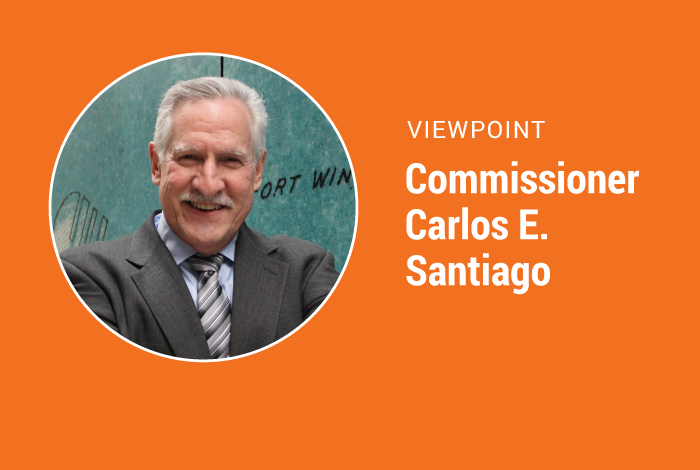
May Viewpoint: Fear Not the Future
Commissioner Carlos E. Santiago
May 14, 2021
On April 21, 2021 I was invited to testify before the Senate Committee on Reimagining Massachusetts Post-Pandemic Resiliency. The discussion included representatives of all the three education agencies serving students from early childhood through higher education. I shared my assessment of how our public higher education system is poised to recover from the ravages of the pandemic.
It’s true that our students experienced a great deal of pain and suffering. Many lost family members and jobs, and stress and anxiety levels skyrocketed. Institutions, too, suffered financial losses and enrollment declines. Still, I believe our Massachusetts institutions will emerge stronger than ever. Here’s why:
- We’re ahead of the curve when it comes to racial equity. The Equity Agenda was launched in 2018, well before the pandemic hit. We are better prepared today to identify and meet the needs of Black, Latinx, and other Students of Color who have yet to be served equitably in higher education. There is clarity of purpose in Massachusetts; the focus on racial equity has also positioned our institutions to lead in this important national conversation. I believe that we are better positioned than most states to address the inequities that the pandemic has exacerbated.
- We’ve proven we can turn on a digital dime. It’s a cliché but bears repeating on the current climate: necessity truly is the mother of invention. The transition to remote learning occurred at lightning speed – in a matter of days, at some institutions – and I’m proud of how rapidly our faculty and staff traversed a steep learning curve. The new realities of teaching and learning are being embraced and multiple options (online, face-to-face, hybrid) are now available to students. This increase in learning and teaching options allows us to reach broader populations of students, including those who need flexibility to juggle classes with work and parenting duties. The expansion of learning modalities also coincides with development of our first full competency-based degree program in the much-needed field of early education. Through our Higher Education Innovation Fund we have invested $800K over the last five years to support this effort in the community college segment.
- We’re seeing results from stronger collaborations with sister agencies and advocates. FAFSA completion is one good example. This is a leading indicator of whether and how many students will return to campus in the fall. Massachusetts continues to close the completion gap between 2020-21 and 2021-22. U.S. Department of Education data shows that the Commonwealth is ranked #5 nationally in FAFSA completion among high school seniors, which represents only a 4.4% decline from the prior year. The gap has closed significantly since we raised our concerns on this issue to the Board of Higher Education in December. This progress is due to a multi-faceted marketing and communications effort in collaboration with the Executive Office of Education and the Department of Elementary and Secondary Education. Together we funded an ad campaign called “You’re Worth It,” encouraging students to fill out the FAFSA even if their plans for next year remain in flux. The campaign featured creative work by the Think Argus agency, with a website, events for students and families, and messages appearing on state-owned billboards and across social media. Text messages were geo-coded to districts where the need for increased FAFSA completion was most acute. DHE also sent out nearly 100,000 emails to prior year applicants. Despite all the progress, I have approved the extension of the deadline for FAFSA completion to July 1 for application to the MASSGrant program – as another means of maximizing aid to students.
- We’re expanding our focus on the foundations of student success. We know that access to and success in college is not exclusively an issue of academic preparation or tuition affordability. Creating and improving wraparound student supports will be vital to the success of the Equity Agenda and increases in college completion rates. The Legislature has already provided critical support in this area with the creation in FY21 of the SUCCESS Fund (Supporting Urgent Community College Equity through Student Services) to invest in supports and services for community college students such as peer mentors, academic skills workshops, and targeted academic, career, transfer, and scholarship advising. We are also focused on basic needs security, moving from pilot housing programs for homeless students to a more broad-based, holistic approach. We are focused on mental health concerns, and will soon release an RFP for tele-counseling services for students across the higher education system.
- We’re committed to culture change at DHE and across the higher education system. Moving from a traditional focus on college-ready students to the work of becoming student-ready colleges will take time and necessitate a cultural shift. At DHE, our Lumina-funded work is underway. The system-level work to reimagine the undergraduate experience and the agency-level work to audit DHE’s policy scheme through a racial equity lens have been launched. And DHE staff have engaged in professional development in racial equity work, an ongoing series of community conversations on our organizational culture, and other initiatives focused on turning the lens inward and living anti-racist values in our day-to-day practices.
The coming months won’t be easy. But I’m proud of the way we’ve positioned ourselves to meet the challenges ahead.
